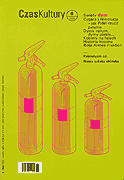Prawda nigdy nie jest prawdziwa
The Truth is Never Real - Agnieszka Taborska talks to Christian Boltanski
Author(s): Agnieszka Taborska, Christian BoltanskiSubject(s): Fine Arts / Performing Arts
Published by: Stowarzyszenie Czasu Kultury
Keywords: life; death and God in the works of Boltanski; the Christian significance of Boltanski’s works; achieving a universal dimension in art;
Summary/Abstract: In his art Christian Boltanski tries to find answers to the never-ending questions about life, death and God. With his eyes wide open he is inspired by everyday events. He does not assume the pretentious and superior pose of “the artist” and instead of being praised for his artistic achievements he prefers it when people say “I don’t know if this is art, but I can feel something”. His aim is to evoke real and sincere emotions, although he considers himself a fraud because he does not know what the truth really is. Thousgh with his art Boltanski wishes to investigate human nature. In The Dead Swiss the “breath of death” stresses an issue which is negated although it is a fact of life. Despite being a rich nation living in a healthy country, the Swiss cannot deceive destiny. The artist stresses that Christian issues are important in his works, because Christianity is the only religion which idealises the misery and poverty as well as the exceptional character of human life. That is why he uses everyday objects in his art, for example second-hand clothes arranged on the floor. What is important is the fact that it is people who give these objects an identity and a history. Boltanski’s art is differently perceived in different parts of the world. If an exhibition is taking place in Japan critics stress the Japanese roots of his art and in Poland it is considered to originate from Christian ideas. This proves that Christian Boltanski is capable of achieving a universal dimension in his works in accordance with his opinion that “being an artist is talking about one’s own village which should become everybody’s village”.
Journal: Czas Kultury
- Issue Year: 2003
- Issue No: 06
- Page Range: 72-77
- Page Count: 6
- Language: Polish
- Content File-PDF

